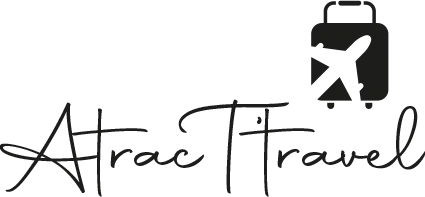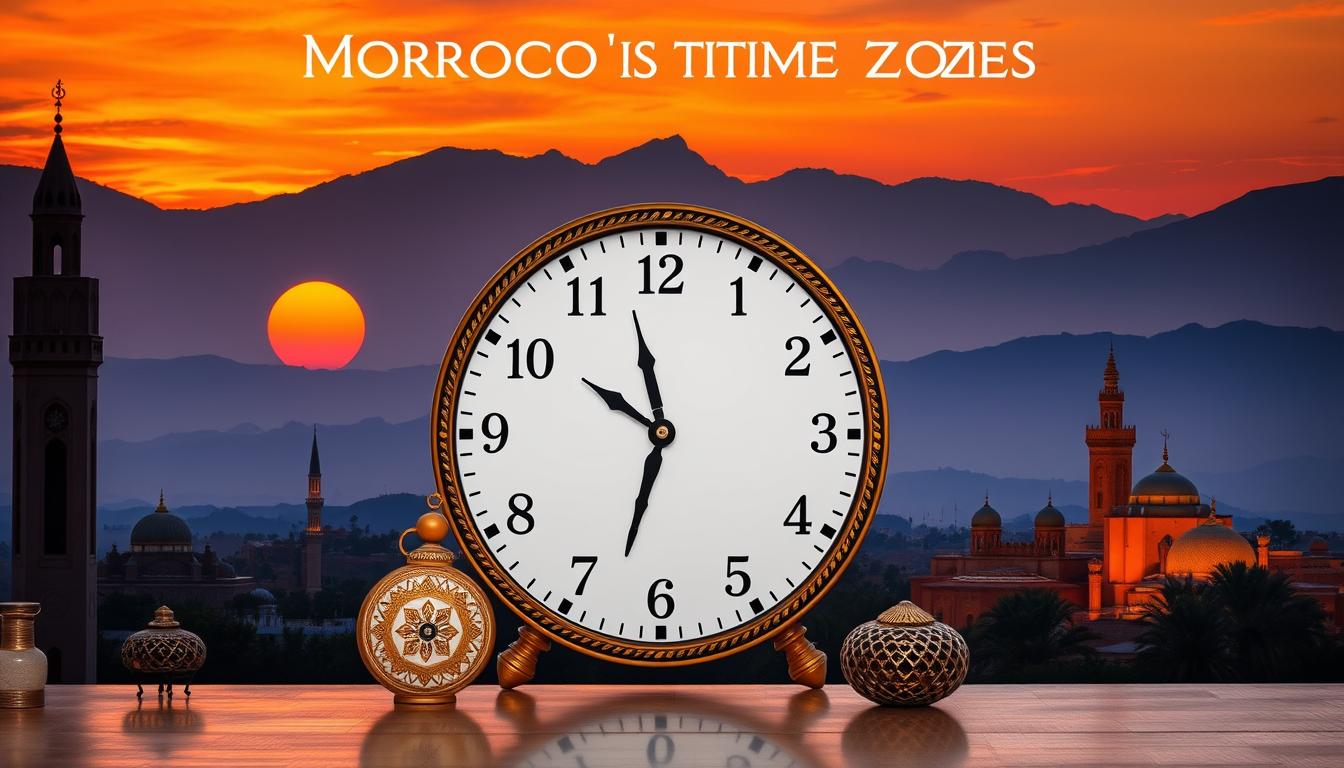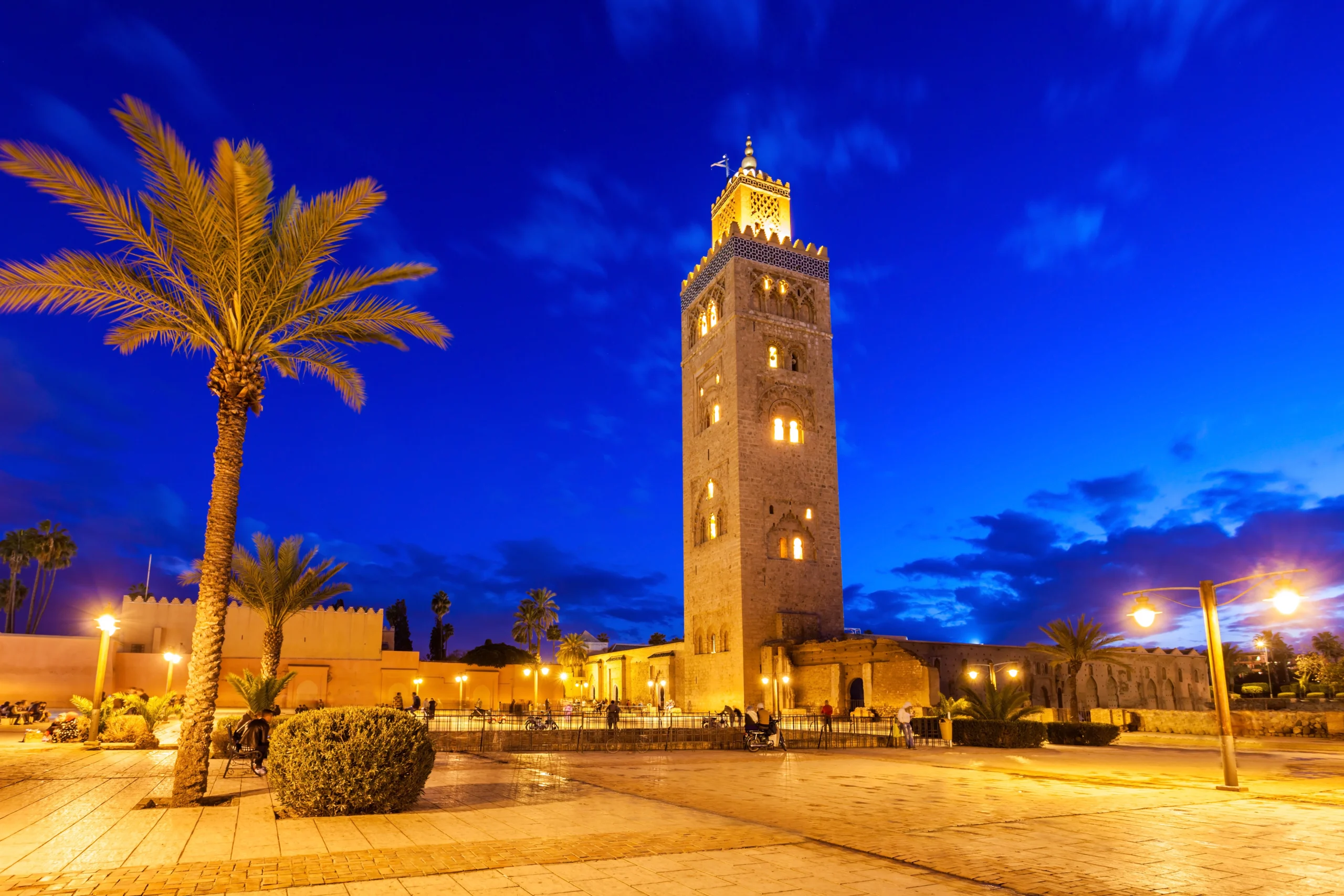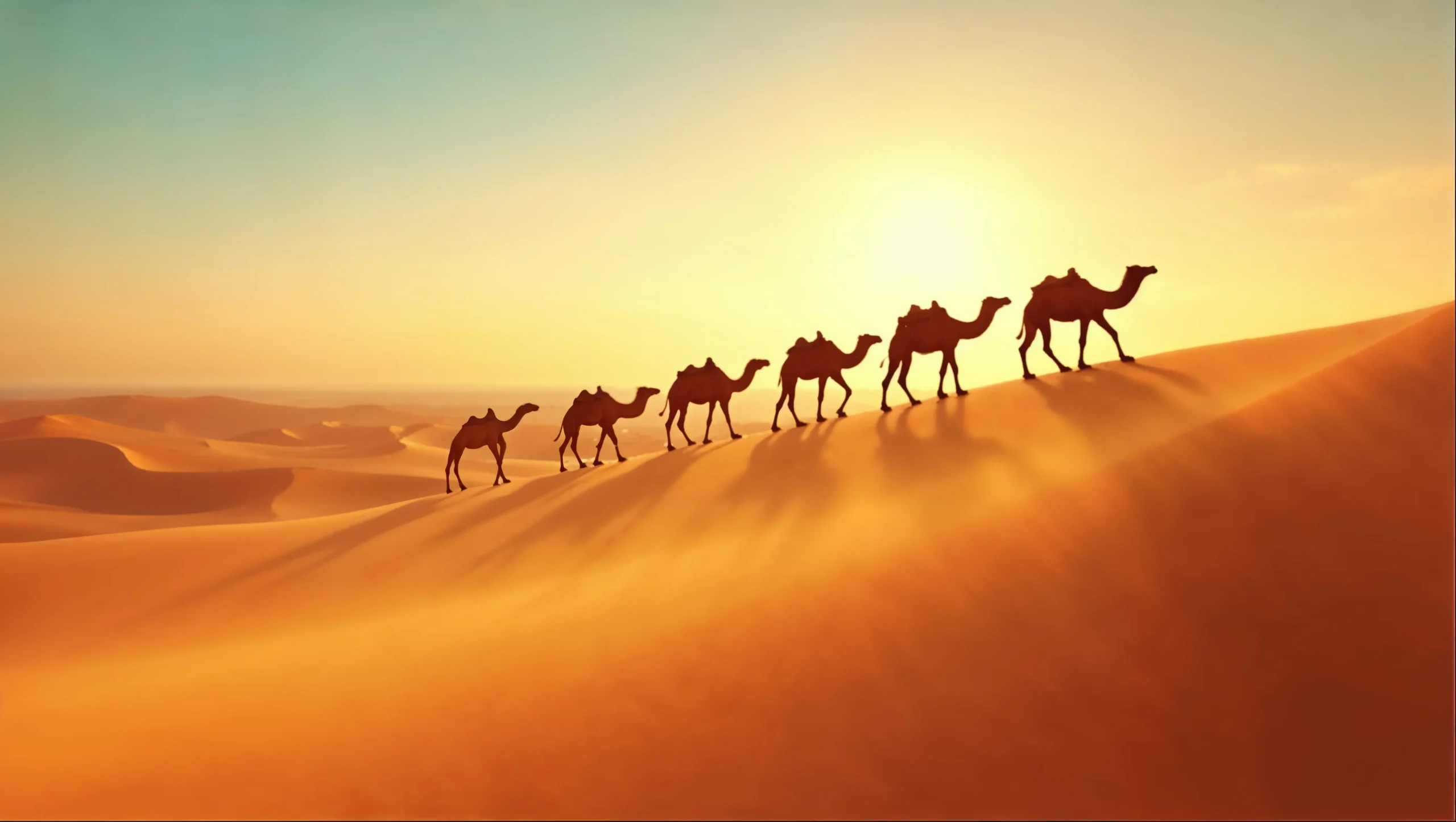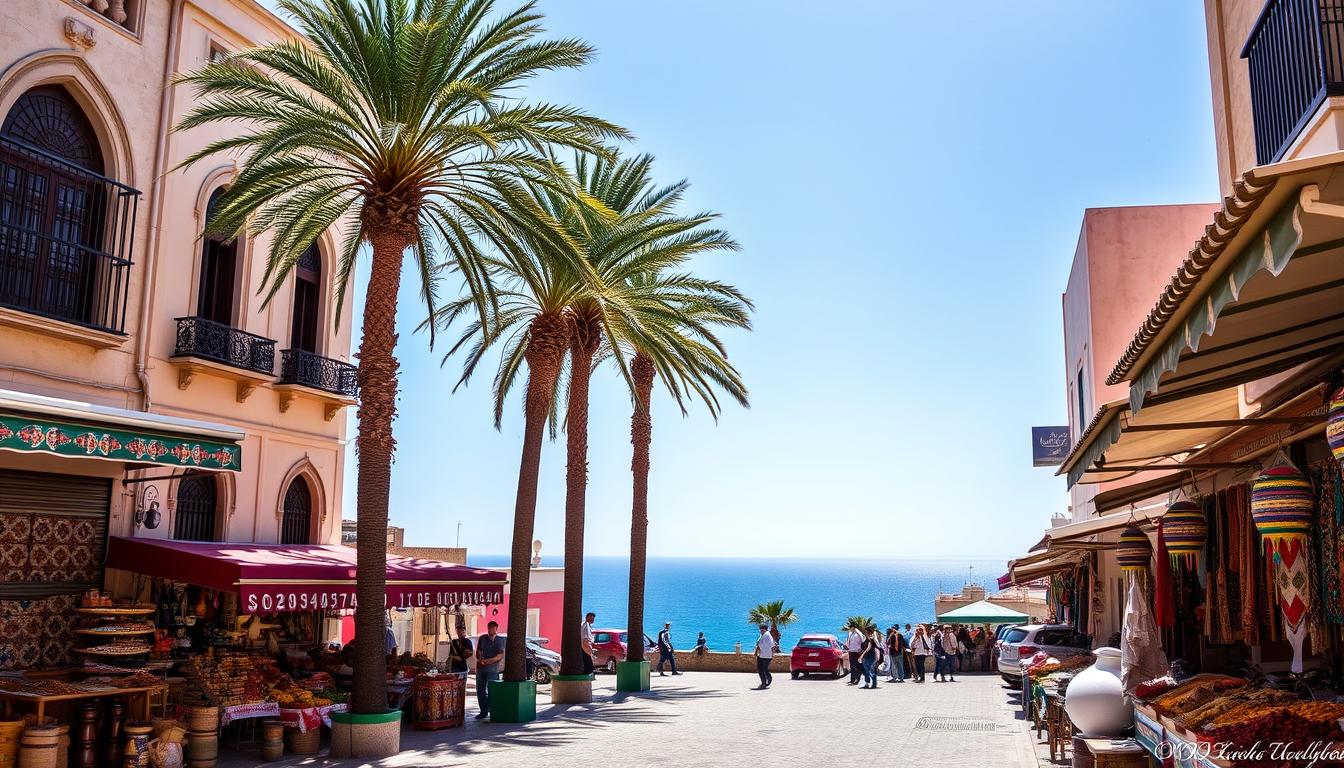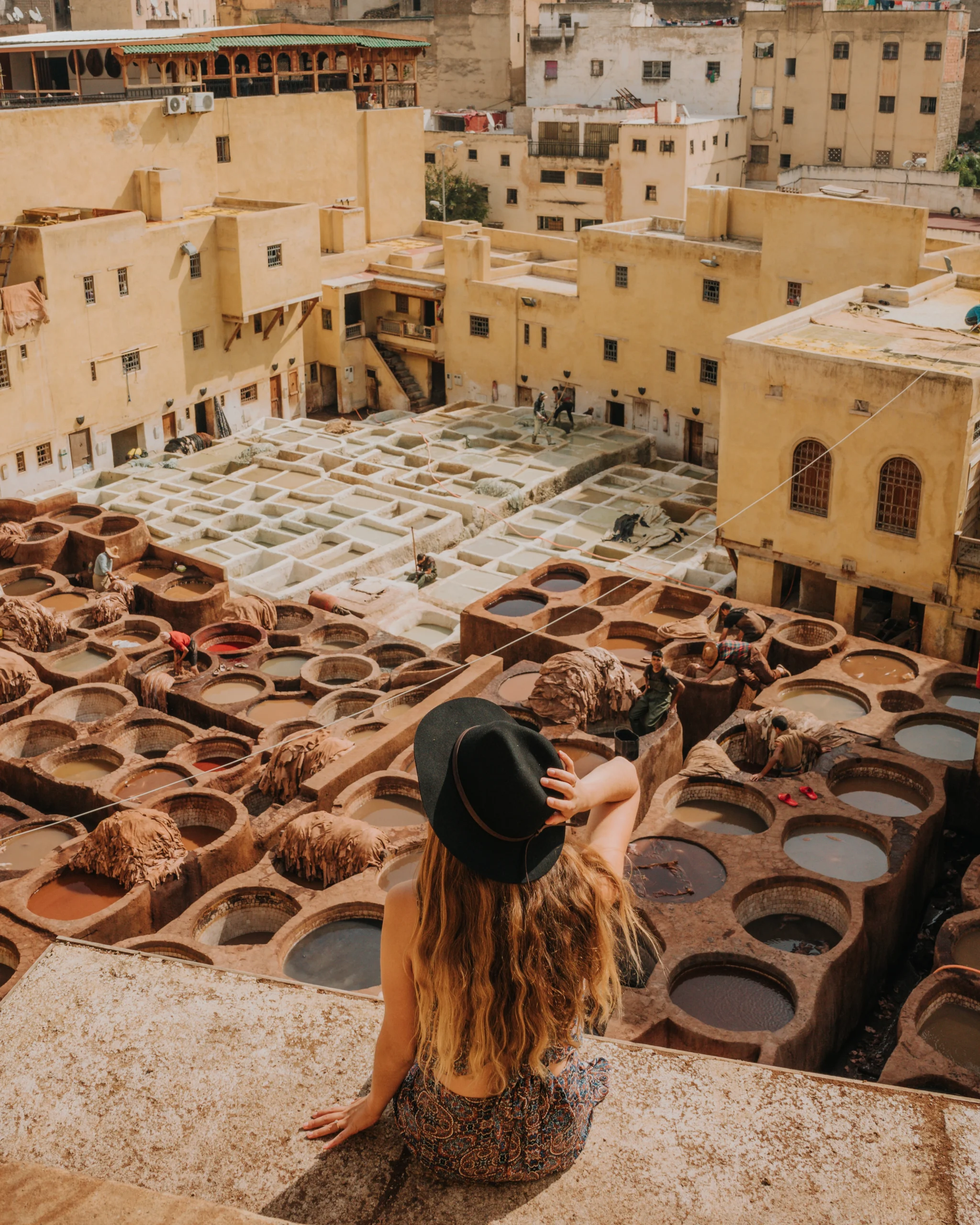During my first evening in Marrakech, the warm Moroccan sun set. It made me realize how time changes a traveler’s experience. Knowing the time in Morocco is more than just looking at a clock. It’s about feeling the rhythm of ancient medinas and busy streets.
For travelers, knowing Morocco’s time zones is key. Whether you’re exploring cities or desert, knowing the local time is important. It helps you fit in with Morocco’s unique culture.
Morocco is on Western European Time. This affects how people live their daily lives. From Casablanca’s markets to coastal towns, knowing the time zones makes your trip better and more real.
Key Takeaways
- Morocco follows Western European Time (WET)
- Time zones impact travel planning and communication
- Understanding local time helps cultural immersion
- Morocco does not currently observe daylight saving time
- Time differences can affect international travel and calls
Understanding Morocco’s Time Zones
Exploring Morocco’s time zones is both fascinating and educational. The country’s unique location creates a special way of keeping time. This reflects its cultural and continental importance.
The time system in Morocco is more than just numbers. It shows how geography and culture mix to shape our view of time.
The Geographic Context of Morocco
Morocco is in Northwest Africa, at a key spot that shapes its time zones. Its geography affects how it keeps time:
- It’s at the northwestern tip of Africa.
- It borders the Atlantic Ocean and Mediterranean Sea.
- It covers different landscapes.
Main Time Zone: Western European Time
Morocco mainly uses Western European Time (WET). This standard time helps keep things consistent across the area. Here are some key points about this time zone:
| Time Zone Detail | Specification |
|---|---|
| Standard Time | UTC+0 |
| Daylight Saving | UTC+1 |
| Geographic Coverage | Western Morocco, including major cities |
“Time is a dimension that connects cultures and geographies in ways we often overlook.” – Anonymous Travel Researcher
Knowing about Morocco’s time zones helps us see the unique way this North African nation views time.
Current Local Time in Morocco
Knowing the current time in Morocco is key for travelers, business folks, and anyone in touch with Morocco. It helps with smooth communication and planning.
There are many ways to find Morocco’s local time. Modern tech makes it easy and fast.
Digital Time-Checking Methods
Here are some digital tools to track Morocco’s time:
- World Clock websites
- Smartphone time zone apps
- Online time converters
- GPS-enabled devices
Recommended Online Resources
Here are some trusted sites for Morocco’s local time:
- TimeAndDate.com – Offers precise global time tracking
- WorldTimeServer.com – Provides instant time conversions
- Google Time Zone – Quick and accessible time information
“Accurate time tracking is the key to seamless international communication.” – Global Time Experts
Remember, Morocco is on Western European Time (WET). Most digital tools adjust for daylight saving time, keeping your info up-to-date.
Mobile App Recommendations
Think about getting time zone apps for international tracking. They offer:
- Automatic location detection
- Offline time tracking
- Multiple time zone comparisons
- Customizable world clock displays
Time Zone Changes in Morocco
Traveling to Morocco can be tricky due to time changes. Knowing how the country handles daylight saving time helps you plan better. It also helps you avoid scheduling problems.
Morocco’s way of handling time changes is unique. It affects both locals and visitors. The country uses daylight saving time to save energy and boost productivity.
Daylight Saving Time Observations
Morocco’s daylight saving time follows a clear pattern. Here are some important details:
- Morocco usually starts daylight saving time in late March
- It goes back to standard time in late October
- Clocks move forward or backward by one hour during these times
Impact on Travel Plans
Time changes in Morocco can impact your travel. Here are some things to consider:
- Check the current time zone before you leave
- Update your devices and watches
- Make sure you can reach local contacts
“Knowing about time changes can make your trip to Morocco better and more fun.” – Travel Expert
Pro tip: Always check official Moroccan government sources for the latest on time zone changes.
Comparing Time Differences: Morocco vs. USA
Knowing the time difference between Morocco and the USA is key for travelers, business folks, and those who talk to people all over the world. It’s vital for planning meetings or calls between these two places.
The time in Morocco can be quite different from the USA, depending on the U.S. time zone. Here’s a look at the time differences for major U.S. areas:
- Eastern Time Zone: 5 hours behind Morocco
- Central Time Zone: 6 hours behind Morocco
- Mountain Time Zone: 7 hours behind Morocco
- Pacific Time Zone: 8 hours behind Morocco
Navigating Time Zone Challenges
For international calls, try these tips:
- Use digital world clock apps for real-time tracking
- Always confirm the current time before scheduling
- Account for daylight saving time shifts
| U.S. Time Zone | Time Difference | Best Call Times |
|---|---|---|
| Eastern | -5 hours | Morning/Early Afternoon |
| Central | -6 hours | Late Morning/Midday |
| Mountain | -7 hours | Late Morning |
| Pacific | -8 hours | Early Morning |
Professional Communication Strategies
When dealing with time zones, being flexible and prepared is important. Always check the exact time in Morocco before calling internationally to make sure your communication is effective and respectful.
“Time is a universal language when approached with understanding and consideration.” – Global Communication Expert
Cultural Considerations: Time in Morocco
Understanding time in Morocco is more than just looking at a clock. In Moroccan culture, time is seen as flexible. It shows the importance of social connections and traditions.
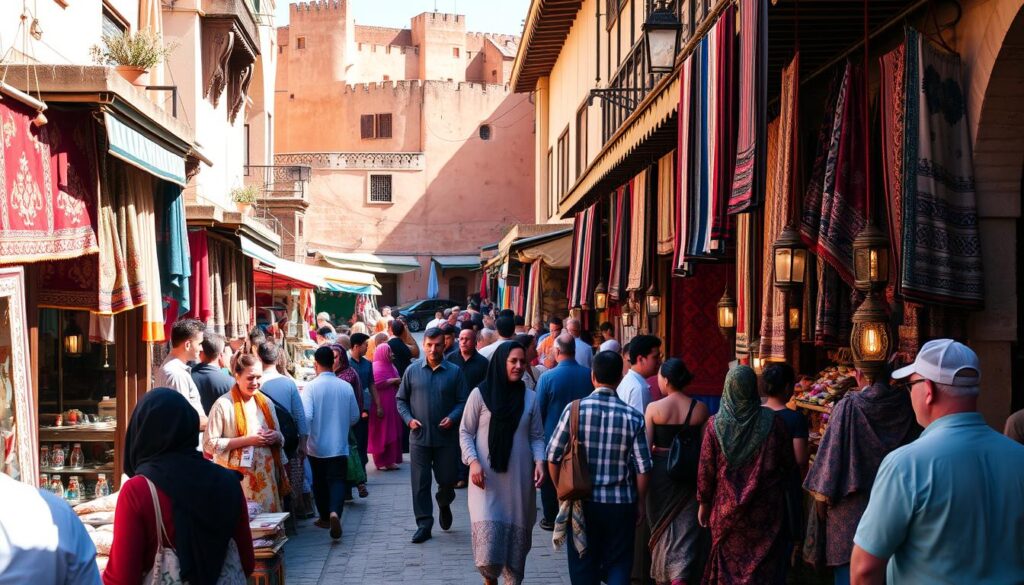
In Morocco, time is viewed differently than in the West. It’s more about relationships than being on time.
The Rhythm of Daily Life
Moroccans plan their day around important things:
- Prayer times shape their schedules
- They value long social talks
- Work and meals are flexible
Social Gatherings and Meal Times
Moroccan social life shows a unique view of time:
| Meal Time | Typical Schedule | Cultural Significance |
|---|---|---|
| Breakfast | 7-9 AM | Light meal, often shared family moment |
| Lunch | 1-3 PM | Extended social gathering |
| Dinner | 8-10 PM | Major social event with family/friends |
“In Morocco, time is not something to be managed, but experienced.” – Moroccan Cultural Proverb
The concept of “Moroccan time” values spontaneity and human connections. It makes social interactions more natural and deep.
Tools to Convert Time for Travel
Planning a trip to Morocco can be tricky because of time zones. Luckily, many digital tools make it easy to convert time. Knowing the right tools helps you stay in sync with different time zones.
Travel technology has changed how we handle international time differences. With smartphones and the internet, tracking Morocco’s time is now simple.
Mobile Apps for Time Conversion
There are many great mobile apps for time conversion:
- World Clock – offers real-time updates for Morocco’s time zones
- Time Buddy – visual interface for comparing multiple time zones
- Every Time Zone – minimalist design for quick conversions
Online Time Zone Converters
Online tools are good alternatives when apps aren’t handy:
- TimeAndDate.com – a global time conversion platform
- World Time Buddy – a web-based time zone calculator
- Google Time Zone Converter – an instant, integrated solution
“Accurate time conversion is the traveler’s best friend” – Global Travel Experts
Choose tools that update automatically and offer precise morocco time converter functions. This ensures your travel plans go smoothly.
FAQs About Time in Morocco
Traveling to Morocco means getting used to its unique time rules. Whether for work or fun, knowing Morocco’s time helps your trip go smoothly.
Finding your way through Morocco’s time zones can be a challenge. Here are answers to common questions about time in this exciting North African country.
How Does Time Work in Morocco?
Morocco follows Western European Time (WET), which is UTC+0. When daylight saving time comes, it moves to UTC+1. Here are some important details:
- Standard time zone is Greenwich Mean Time (GMT)
- Daylight saving time is from March to October
- Clocks move forward by one hour in summer
What is the Best Time to Visit Morocco?
The best time to visit depends on what you like. Here’s a guide to help plan your trip:
| Season | Temperature | Travel Experience |
|---|---|---|
| Spring (March-May) | Mild (60-75°F) | Ideal for sightseeing |
| Summer (June-August) | Hot (80-100°F) | Best for coastal areas |
| Autumn (September-November) | Comfortable (70-85°F) | Perfect for cultural events |
| Winter (December-February) | Cool (50-65°F) | Great for mountain exploring |
Spring and autumn are the best times to see Morocco’s varied landscapes and culture. They offer the most comfortable weather.
“Understanding local time is the first step to truly experiencing Morocco’s rich cultural tapestry.” – Travel Experts
Plan ahead and know Morocco’s time zones for a great trip. Don’t forget to set your devices and watches before you leave!
Historical Context of Morocco’s Time Zone
Exploring Morocco’s time zones shows a rich history. It’s a story of colonial impacts and finding national identity. The tale of time in Morocco is deeply linked to its complex past.
Timekeeping in Morocco has been shaped by key historical events. These events changed how the nation views time. During colonial times, foreign powers brought new ways to track time.
Colonial Influences on Timekeeping
French rule was key in setting Morocco’s timekeeping ways. Before the French came, people used solar time, which changed by region. The French brought standardized time zones, changing how Moroccans saw time.
- Pre-colonial time tracking relied on solar observations
- French administrators introduced standardized time measurement
- Western European Time became the primary time zone
The Evolution of Time Standards
After gaining freedom in 1956, Morocco worked on its time zone. The country aligned with global standards but kept its own unique view.
“Time is not just a measurement, but a reflection of cultural identity and historical transformation.” – Moroccan Time Historians
| Historical Period | Time Tracking Method | Key Changes |
|---|---|---|
| Pre-Colonial Era | Local Solar Time | Varied by region |
| Colonial Period | Standardized Western Time | Unified time zones introduced |
| Post-Independence | Western European Time | Refined national time standards |
Today, Morocco keeps adjusting its time zone practices. It balances old traditions with modern global connections. The story of timekeeping shows Morocco’s strength and ability to grow.
Adjusting to a New Time Zone
Traveling to Morocco can be tough because of the time difference. Your body’s clock might find it hard to adjust. This can make your trip less enjoyable.
Knowing the current time in Morocco is key to beating jet lag. It helps you stay on schedule and keep your energy up.
Jet Lag Survival Strategies
Jet lag can ruin your trip. Here are some tips to help you cope:
- Adjust your sleep schedule before you leave
- Drink lots of water during and after the flight
- Get some sunlight as soon as you arrive
- Avoid big meals when you’re adjusting
Syncing Your Personal Schedule
Getting used to Morocco’s time zone takes planning. Here’s how to do it right:
- Change your watch to local time right after you land
- Stick to the local meal and sleep times
- Use apps on your phone to keep track of time
- Do easy activities for a few days while adjusting
*”Time is a created thing. To say ‘I don’t have time’ is to say ‘I don’t want to’.”* – Moroccan Proverb
| Adjustment Technique | Effectiveness Rating |
|---|---|
| Natural Sunlight Exposure | 90% |
| Hydration | 85% |
| Sleep Schedule Alignment | 80% |
With these tips, you can handle the time difference in Morocco. You’ll have a better travel experience.
Time Management in Moroccan Business Culture
Understanding time and professional interactions in Morocco is key. You’ll see a mix of old traditions and new ways. This blend shapes what time in Morocco means for business.
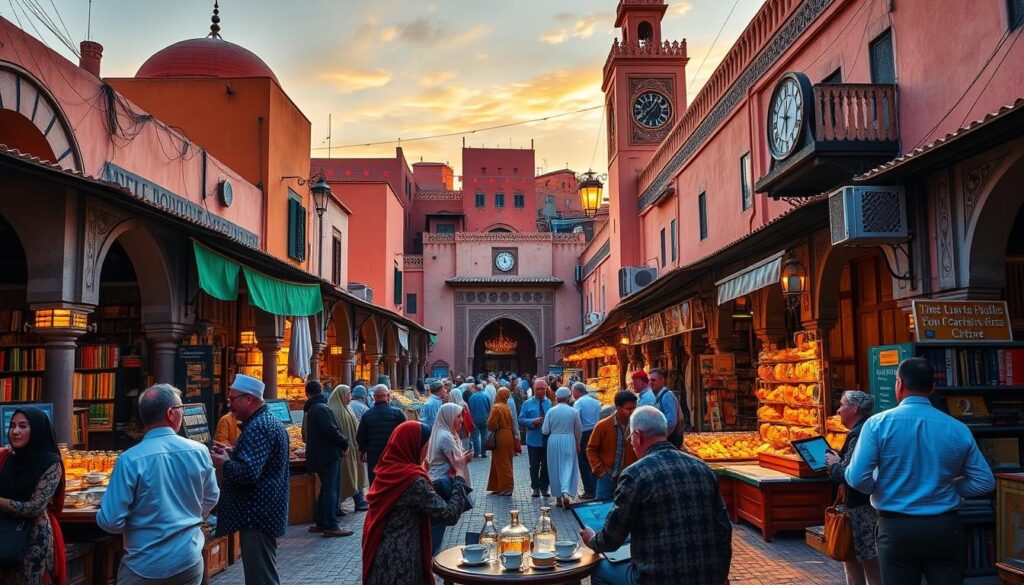
The local time in Morocco changes how business works. It’s influenced by cultural differences from Western ways.
Importance of Punctuality
In Morocco, being on time is flexible. People value respect for time but don’t stress about strict schedules:
- Meetings may start later than planned
- Building personal relationships is more important than strict times
- Being patient and flexible is highly valued
Business Hours in Morocco
Knowing typical business hours helps plan better:
| Business Aspect | Typical Hours | Special Considerations |
|---|---|---|
| Standard Work Week | Saturday-Thursday, 9 AM – 6 PM | Friday is a religious day |
| Ramadan Period | Shortened hours, 10 AM – 3 PM | Reduced productivity expected |
| Lunch Break | 12:30 PM – 2:00 PM | Extended social interaction common |
“In Morocco, business is about relationships first, transactions second.” – Moroccan Business Proverb
When setting up meetings or calls, keep these cultural points in mind. They help ensure your professional interactions are successful.
Technological Advances in Timekeeping
Digital technology has changed how we track and manage time. Morocco is embracing these new solutions. Modern morocco clock technologies are making traditional timekeeping better, with more precision and ease.
The digital era has brought big changes to time management, mainly in Morocco. Smartphones, smartwatches, and apps for time conversion are key. They help us keep track of time everywhere.
Role of Technology in Time Awareness
Technology has made time awareness better through many ways:
- GPS-enabled time synchronization
- Automatic time zone adjustments
- Real-time global time tracking
- Precision digital clock applications
Smart Devices and Time Management
Smart devices now help us manage time better. They fit into our daily lives easily. These tools help us:
- Coordinate international communications
- Schedule cross-continental meetings
- Manage travel itineraries
- Maintain productivity across different time zones
“Technology has transformed timekeeping from a mechanical process to an intelligent, adaptive system.” – Tech Innovation Report
Here’s a comparison of digital time management features:
| Device Type | Time Tracking Features | Accuracy |
|---|---|---|
| Smartphones | Multiple time zone display | 99.9% |
| Smartwatches | Automatic time synchronization | 99.7% |
| Digital Converters | Instant global time translation | 100% |
These tech advancements are changing how we deal with time. They offer unmatched precision and connection for Moroccans and people worldwide.
Exploring Morocco’s Regions and Time Variations
Morocco’s diverse landscape leads to interesting time zone and local time practices across regions. Knowing these unique rhythms helps us see the country’s rich time diversity.
Time experiences vary greatly in Morocco, depending on where you are and the culture. Cities, coastlines, and mountains each have their own daily schedules. These are shaped by the climate, traditions, and what people do for work.
Regional Daily Schedule Dynamics
Moroccan regions have their own ways of managing time:
- Coastal cities like Casablanca have more set work hours
- Mountain areas in the Atlas Mountains follow the farm’s rhythm
- The desert, like the Sahara, has more flexible time
Local Activities Based on Time of Day
Daily activities change a lot in different Moroccan regions:
| Region | Morning Activities | Afternoon Practices |
|---|---|---|
| Coastal Regions | Early fishing trips | Tourism and sea trade |
| Mountain Areas | Farming work | Shepherding and crafts |
| Urban Centers | Work and professional tasks | Shopping and business |
“Time in Morocco is not just a measurement, but a cultural experience reflecting regional diversity.” – Moroccan Cultural Historian
Understanding these time variations helps visitors see Morocco’s rich culture. It also helps them adjust better during their travels.
The Future of Timekeeping in Morocco
Technology and global communication are changing fast. Morocco is looking at new ways to manage time. They want to keep up with modern challenges and global standards.
The way Morocco handles time is changing quickly. There are big plans for time zone rules and daylight saving. Policymakers are looking at these changes closely.
Emerging Trends in Time Zone Policies
- Increased focus on digital synchronization
- Potential alignment with global time standards
- Enhanced technological integration
Morocco’s daylight saving time is getting better. Experts think there will be big changes soon. These changes could make timekeeping easier and more accurate.
Predictions for Time Management
- More precise digital time tracking
- Potential standardization of regional time differences
- Improved international synchronization
| Current Practice | Potential Future Approach |
|---|---|
| Manual time adjustments | Automated digital time synchronization |
| Regional time variations | Unified national time standard |
“The future of timekeeping is not just about tracking hours, but about creating seamless global connections.” – Time Technology Experts
Morocco is leading the way in time management. They are committed to modernizing. This means exciting changes in how we understand and use time in the future.
Keep an eye on these trends. They will change how Morocco tracks and synchronizes time in our connected world.
Local Practices and Time Awareness
Knowing the time in Morocco is more than just looking at the clock. The country mixes modern time with deep cultural traditions. These traditions shape how people manage their schedules and daily lives.
Moroccan time management is special. It balances being precise with being flexible. Even with modern tech, old ways of keeping time are important in everyday life.
How Locals Stay On Schedule
- Smartphones and digital devices for precise timekeeping
- Traditional prayer times as natural scheduling markers
- Community-based time awareness through social networks
- Reliance on local mosque call times for daily rhythms
Traditional Practices Related to Time Measurement
In Morocco, time is more than just numbers. Local communities use special ways to track and share time:
| Traditional Method | Time Tracking Approach |
|---|---|
| Solar Positioning | Using sun’s position for approximate time |
| Call to Prayer | Five daily prayer times as time markers |
| Seasonal Changes | Agricultural and natural cycle indicators |
“Time is a guest that comes without warning.” – Moroccan Proverb
Understanding time in Morocco gets richer when you see these cultural details. Modern tech and old ways of tracking time work together. This creates a unique way of seeing time.
Conclusion: Staying Informed About Time in Morocco
Knowing what time it is in Morocco is key for travelers, business folks, and culture lovers. Morocco’s time zones and local ways of keeping time are different. It’s not just about looking at clocks. It’s about understanding time in a deeper way.
Exploring Moroccan time is more than just tracking hours. It’s about getting into the local culture and rhythms. Whether it’s for work or fun, Morocco’s time shows a mix of old and new ways.
Key Takeaways
Remember, Morocco is on Western European Time, with daylight saving time changes. Knowing about time in Morocco can help you fit in better. Use digital tools and time zone converters to stay on track with Moroccan time.
Resources for Learning
To learn more, check out Moroccan government sites, international time zone databases, and cultural exchange platforms. These can give you a deeper look into timekeeping in Morocco. They help you understand this interesting part of Moroccan culture better.
FAQ
What time zone is Morocco in?
Morocco is in the Western European Time Zone (WET). This means it’s UTC+0 during standard time. It’s UTC+1 during daylight saving time.
Does Morocco observe daylight saving time?
Yes, Morocco does observe daylight saving time. It switches to daylight saving in the spring. Then, it goes back to standard time in the autumn, changing clocks by one hour.
How can I check the current time in Morocco?
You can check it online. Use time zone converters, world clock websites, or smartphone apps. You can also search “current time in Morocco” on search engines or time-specific websites.
What is the time difference between Morocco and the United States?
The time difference depends on the U.S. time zone:
– Eastern Time: 5 hours ahead
– Central Time: 6 hours ahead
– Mountain Time: 7 hours ahead
– Pacific Time: 8 hours ahead
Are there any regional time variations within Morocco?
Morocco mainly uses one time zone across the country. While daily schedules might vary locally, the official time is consistent everywhere.
How do Moroccans typically approach time in daily life?
Moroccans have a more relaxed view of time than some Western countries. Punctuality is key in business, but social events are more flexible. This is often called “Moroccan time”.
What are the typical business hours in Morocco?
Business hours in Morocco are from 9:00 AM to 6:00 PM. There’s a lunch break from 12:30 PM to 2:00 PM. During Ramadan, hours might change.
How do I avoid jet lag when traveling to Morocco?
To avoid jet lag, try these tips:
– Adjust your sleep schedule before traveling
– Stay hydrated
– Get natural sunlight
– Avoid heavy meals and caffeine
– Try to adjust to local time right away
Are there any mobile apps for time conversion to Morocco?
Yes, there are many mobile apps for converting time to Morocco. World Clock, Time Zone Converter, and Time Buddy are reliable options. These apps provide real-time conversions and are great for travelers.
What is the best time to visit Morocco?
The best time to visit Morocco depends on what you like. Spring (April-May) and autumn (September-November) have nice weather. Summer is hot, and winter can be cool, mainly in the mountains.
